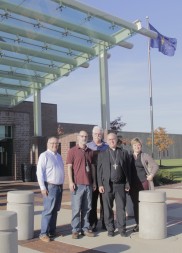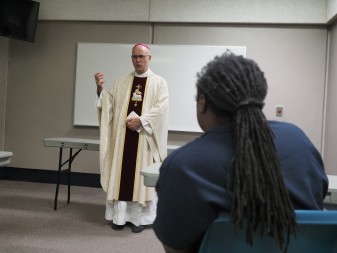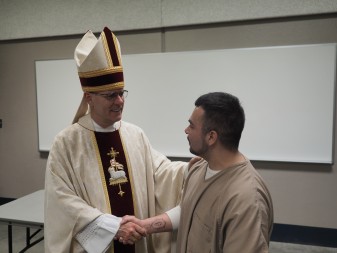November 8, 2016 // Uncategorized
Bishop visits Elkhart County Jail

Bishop Kevin C. Rhoades celebrated a Jubilee Mass for inmates at the Elkhart County Jail. Pictured, from left, are Mark Griffith, volunteer jail chaplain and member of St. Mary of the Annunciation parish, Bristol; Jail Chaplain Cory Martin; Mike Rody, jail volunteer and member of St. Mary’s; Bishop Rhoades; and diocesan Jail Ministry Coordinator Audrey Davis. Not pictured is Brad Todorovich of St. Vincent de Paul Parish, Elkhart, musical accompanist for the Mass.
On the weekend of the Church’s Jubilee for Prisoners during the Jubilee Year of Mercy, Bishop Kevin C. Rhoades celebrated Mass and visited with inmates at the Elkhart County Jail. Accompanied by jail chaplain Cory Martin and Catholic volunteers, the bishop received a tour of the facility. He learned that the Mass during his visit was the first time the Eucharist has been celebrated in the Elkhart County Jail.
Bishop Rhoades expressed his gratitude to jail Chaplain Martin and Audrey Davis, diocesan Jail Ministry coordinator, for planning and organizing his visit. He also expressed his appreciation for the ministry of the Catholic volunteers who regularly visit the jail.
When asked about the purpose of his visit, the bishop simply answered: “Jesus said; “I was in prison and you visited me.” He explained that visiting the imprisoned is one of the corporal works of mercy and expressed his hope that Catholic ministry will grow and expand at Elkhart County Jail and other correctional facilities throughout the diocese. He hopes that this will be one of the fruits of the Jubilee Year of Mercy in the Diocese of Fort Wayne-South Bend.
Bishop Rhoades, who was active in prison ministry as a priest, explained how impactful this has been in his life: “It has helped me to grow in compassion as I learn about the lives of the inmates, many of whom did not benefit from the stable upbringing, loving home and good education that I experienced. I often think that I could be in their situation if their circumstances had been mine growing up.
“It meant a lot to me to celebrate Mass and pray with the men at Elkhart County prison,” he continued. “They are hungry for the Word of God and eager to learn the faith. I encouraged the men not to waste their time while in jail, to use their time to pray, to read the Scriptures, and to study the faith. The men shared with me their hope that Mass would be celebrated regularly for them in the jail. The Mass we celebrated was the first opportunity that most were able to receive the Holy Eucharist in a long time. The non-Catholics who attended the Mass were also grateful. At the time of Holy Communion, they received blessings, and throughout the liturgy eagerly joined in the songs and prayers.”

Following the Mass the bishop was able to spend time speaking with individual Elkhart County Jail inmates and give them a blessing. He is pictured with members of the male inmate population.
The bishop shared that he feels he receives more than he gives when he visits jails and prisoners: “Their sincere gratitude always moves my heart. They teach me not to take for granted the blessings owe have, not only our freedom, but also the graces of the Eucharist.”
In addition to his hopes for expanded jail ministry in the diocese, Bishop Rhoades also would like to encourage parishes to provide material and spiritual assistance to prisoners upon their release. He said: “Pope Francis is calling the Church to go out to the peripheries, to those on the margins of society. Clearly this includes outreach to prisoners. Upon their release, these men need a community of loving support and a community of prayer to help them in their resolve to live a better life and to avoid falling back into crime. I hope we will answer the Pope’s call, really the Lord’s call, to extend His mercy and love to these brothers and sisters in need.”
________
Jubilee Masses for prisoners call attention to jail ministry
By Molly Gettinger
1976: that’s the year when, at the age of 16, David was sent to prison. Forty years later, when he was released, things were different: His family members had passed away and his friends had scattered. He had no network, had never held down a job and had little knowledge of the changes that had happened in the world since he was incarcerated.
“It was overwhelming,” he said. “I really struggled with knowing how to live with people out here. I didn’t know how to do anything.”
That’s where the Allen County jail ministry team stepped in. “They helped me with everything,” David said. “Applying for jobs, all sorts of paperwork, clothes on my back, a bicycle for transportation and paying rent so I wasn’t on the streets.
“Even picking up and using a cell phone was difficult, because I had no contact with devices in prison. They weren’t around 40 years ago,” he continued. “In prison, they don’t prepare you to be released. All I knew was the old-fashioned stuff from when I went in.”
 But, through tears, David shared that, “I’m 56 years old, and I am very happy to experience God on a very different level, through being free. I can talk to him better. I love it out here. I often think about all the people God put in my life. You really can’t say thank you. It’s somebody starting your life for you.”
But, through tears, David shared that, “I’m 56 years old, and I am very happy to experience God on a very different level, through being free. I can talk to him better. I love it out here. I often think about all the people God put in my life. You really can’t say thank you. It’s somebody starting your life for you.”
Allen County is one of six counties across the Diocese of Fort Wayne-South Bend that has a jail ministry team. It started about three years ago, and now parishioners from across Fort Wayne regularly help with every component: Bible studies, religious services, a book cart, on-the-block fellowship and more. The St. Vincent de Paul Society hosts an annual collection to help indigent inmates be able to have undergarments issued to them through the chaplaincy office.
Elkhart County is the newest of all the diocesan jail ministry teams. Recently founded through the work of Mark Griffin, the team of five or six individuals hosts discussions, religious services, and Bible studies for their incarcerated brothers and sisters in Christ.
In Huntington County, the jail ministry team does not currently go into the county jail; rather, their points of encounter include requests from family of inmates for spiritual accompaniment, pen-pal requests for soon-to-be-released inmates and reaching out to released inmates to recruit their wisdom and vision for building an impactful ministry.
For this Year of Mercy, the Huntington County team launched a special effort geared especially towards those with family members in jail. On Nov. 15, they will also host a law-enforcement appreciation dinner.
Jail Ministry volunteers in Kosciusko County are focused on long-term plans. Founded two and a half years ago, the team participates in monthly visits to Catholics who are incarcerated: holding prayer services, bringing the Eucharist and engaging in times of reflection. They hope to form a LifeSkills class for people coming to the end of their sentence and aiming for a productive re-entry.
Marshall County, too, is in the early stages of forming its jail ministry. Gene Clingenpeel has been helping inmates as they face re-entry barriers such as finding housing and jobs. Working with Deacon Greg Gerherd of St. Joseph County, Clingenpeel and area churches are also trying to form a network that can more effectively reach out and walk alongside people as they re-enter society.
One of the oldest jail ministry programs in the diocese is in St. Joseph County. Coordinated by Deacon Greg Gehred, a team of priests and few Notre Dame graduate students visit the jail for Sunday Mass, Saturday fellowship and Tuesday one-on-one conversations.
“There is a need for mentors and people to help at the Juvenile Justice Center here in South Bend. There is also a crying need for more housing and support for men and women coming out of jail and out of the state prison system,” Deacon Gehred shared.
Audrey Davis is the Social Justice Ministries coordinator for the Diocese of Fort Wayne-South Bend. She recognized that each jail ministry team comes into contact with these individuals in a different way, but that each one’s responsibility is similar. “Our response is to walk aside re-entry members and learn from them: What are the main barriers impacting families in poverty, leading them to jail, and what can we do to reduce those barriers?”
These teams aim to follow Christ’s model of “encounter, relationship, and response,” she added. “It is our constant vocation to form relationship with the families struggling from poverty and crime in order to understand how to form a social ‘response,’ not just to individual cases but through public expression of our values of forgiveness, human dignity and participation in family and community.”
To learn more and to become involved in jail ministry locally, visit www.diocesefwsb.org/Jail-Ministry.
The best news. Delivered to your inbox.
Subscribe to our mailing list today.






